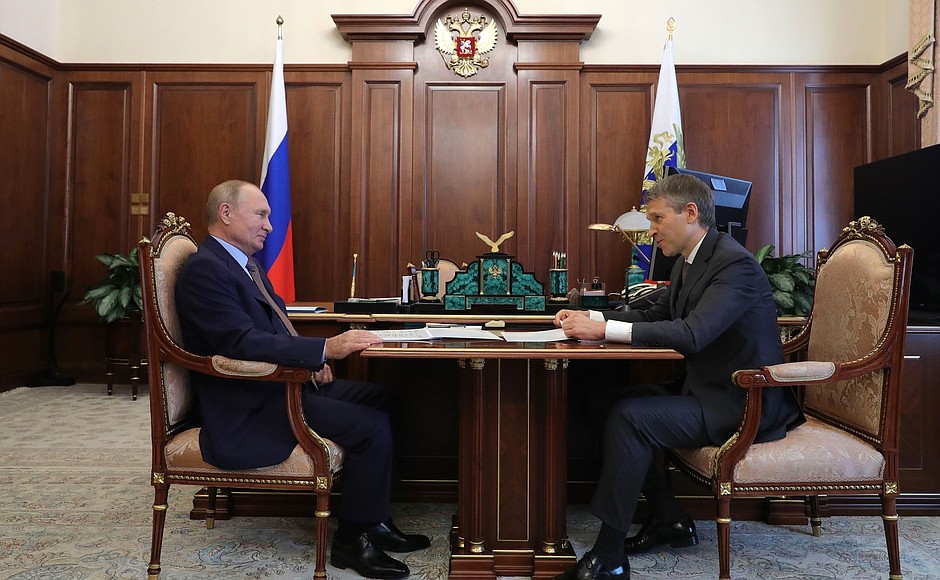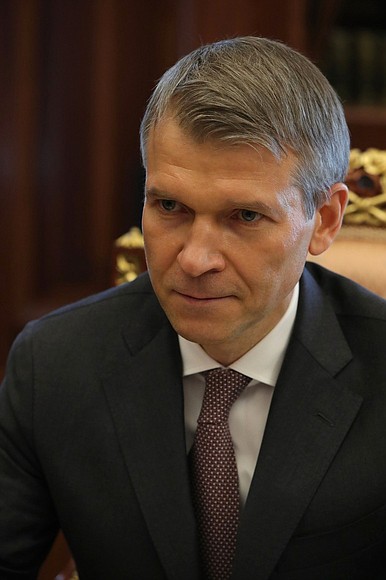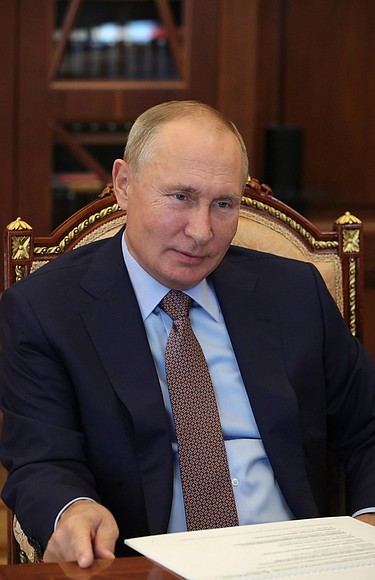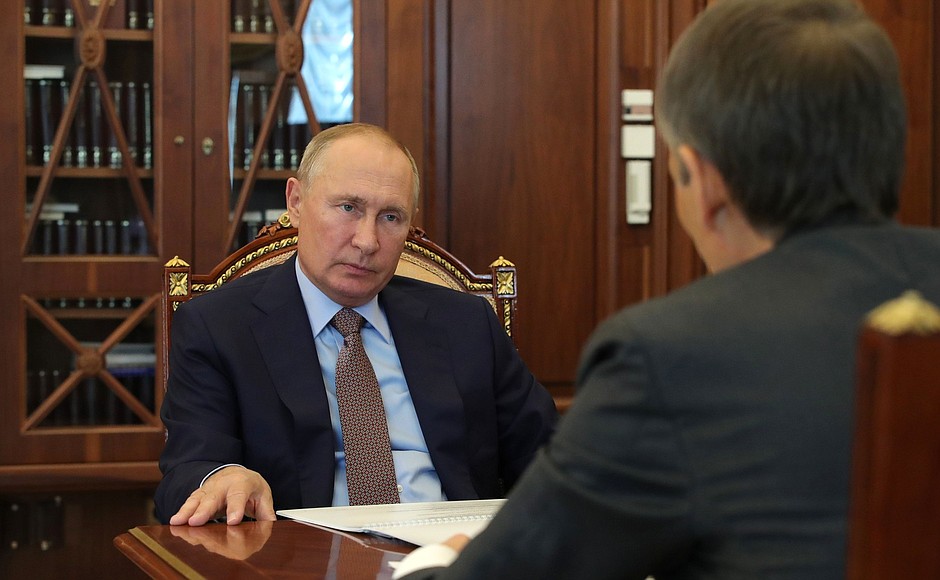President of Russia Vladimir Putin: Mr Listov, this year the bank marks its 20th anniversary.
Once again, my best wishes to you and all the bank’s employees.
Concerning its key performance indicators, the Russian Agricultural Bank is in the top 5 in the size of its loan portfolio. How do you assess the institution’s work? What tasks do you consider as priorities? And, of course, the results for the first half of the year.
Boris Listov, Chairman of the Board of Rosselkhozbank: Allow me to give you a presentation on the bank's work. First of all, I would like to thank you for this meeting.
This year is very special for the bank; we marked our 20th anniversary. The bank has seen significant growth over these two decades, and it has grown along with the industry. Agriculture has become not just an efficient business, but a driver of the national economy.
I would like to thank you personally, Mr President, as well as the Federal Assembly of the Russian Federation, the Government, and the Ministry of Agriculture for their systemic and timely decisions that promoted the development of the agro-industrial sector, including the development of the Russian Agricultural Bank.
Rosselkhozbank was established 20 years ago by your order, Mr President, on March 15, 2000.
Vladimir Putin: I signed the executive order as Acting President then.
Boris Listov: Exactly. And the first transactions were performed in June 2000, so we can say that the anniversary has already taken place.
Today Rosselkhozbank operates in 82 Russian regions. The regional network, the third in size, comprises 1,357 branch offices. The bank has 7 million clients, both individuals and legal entities. An interesting fact: the government invests 459 billion rubles in a bank, and the bank, in turn, provides support for the national agriculture at 9.4 trillion rubles. The bank currently employs 32,000 people.
Currently, Rosselkhozbank is one of the five biggest Russian banks and a backbone bank of the national economy. It ranks fifth in capital (511 billion rubles) and in the amount of attracted funds and private lending. It comes fourth in terms of mortgage and corporate lending.
Most importantly, Rosselkhozbank is the absolute leader when it comes to financing the agro-industrial complex. In 2019, we funded projects worth a total of 1.3 trillion rubles.
The bank’s operation is integral to fulfilling national-level tasks, primarily, developing the agro-industrial complex and rural areas.
The bank is an active participant in the following state programmes: agricultural development, market regulation for agricultural products, raw materials and food; comprehensive development of rural areas; the Agricultural Exports federal project; the Small and Medium-Sized Entrepreneurship and Support of Private Entrepreneurs national project, and the Housing and Urban Environment national project.
Vladimir Putin: Is the mortgage portfolio growing?
Boris Listov: It is growing, especially mortgages for rural housing. I was going to mention this later in my report.
This is a particularly interesting slide, which indicates that Rosselkhozbank investment is not just manifested in figures but in specific results that are tangible on the national scale. One in every two kilograms of pork and beef, one in every two litres of milk and one in every three eggs are products of the companies created with Rosselkhozbank funding. Over the past 20 years, we have supported over 5,200 investment projects. In certain sectors such as greenhouse vegetable farming, we are the primary lender – in other words, we actually shape and drive forward the development of these agricultural sectors.
Summarising the results of 2019, first of all, I would like to note that currently, one in every three rubles of loans issued to the agro-industrial complex comes from Rosselkhozbank. In 2019, Rosselkhozbank provided 22 percent more funds than in 2018 to support agricultural exports. The amount of preferential loans has increased by 20 percent while the amount of loans to residents of rural territories has increased by 13 percent.
One of the most important spheres is seasonal work, where the bank has always been the clear frontrunner. In 2019, we financed 381 billion rubles worth of seasonal work or 72 percent of the market. In quite a few regions, more precisely in 11, we are the only lending bank issuing loans for seasonal work.
This year we increased our lending operations, maintaining a sustainable lending pace, so that Russian farms can have everything they need and the national economy can accelerate its revival.
Next, I would like to report on our performance in the first eight months of 2020. To begin with, I would like to say that farming loans have grown considerably. The issuance of easy-term loans to farmers increased by 47 percent, loans for seasonal work went up by 35 percent, and overall lending to the agro-industrial complex increased by 29 percent. At the same time, our individual loan portfolio went up by only 8 percent, but we expect it to increase by some 20 percent this year compared to the 2019 figures.
We believe that one of our priorities is to ensure maximum effectiveness of government investment in the bank. These funds allow us to attract additional money on the market with the help of the banking multiplier, so that we can increase the financing of our agro-industrial complex every year.
The financing of our agro-industrial complex has increased by 119 percent or 2.2 times over the past five years. At the same time, while increasing the financing of the agricultural sector, the bank used its own funds to accelerate the settlement of the defaulted debts of the past years. The bank spent over 300 billion rubles for this purpose over the past five years, settling 44 percent of the overdue debts.
We plan to further reduce this figure to 6.5 percent by the end of the year, bringing it to the average market indicator.
Vladimir Putin: Who owes you more money, individuals or legal entities?
Boris Listov: Legal entities. We are among the market leaders when it comes to individual loans, holding third or fourth place in terms of quality. We have a very good portfolio of individual loans.
The next two slides are to do with to our clients, because a bank’s strength is in its clients, so we are dedicated to foster market leaders both in terms of production volumes and the use of innovative technologies. There are several examples that I will just quickly go over.
The EkoNiva Group of Companies is the largest dairy producer not only in Russia, but also in Europe. Its milk output is almost 1 million tonnes per year. A more than 100,000 strong dairy herd, with 14,000 jobs. The company operates in 14 regions. The remarkable thing about this project is that its founder and permanent head of the group is Stefan Duerr, a German-born citizen.
Vladimir Putin: Are they in Voronezh?
Boris Listov: Yes, he was granted Russian citizenship in 2014 upon request from Alexei Gordeyev [at that time the Governor of Voronezh Region] on the basis of your executive order for special services to Russia.
Another project is the Damate group, the largest turkey meat producer both in Russia and in Europe. The company applies artificial intelligence solutions that have no analogues in the Russian Federation. Their turkey output stands at 155,000 tonnes a year; 4,000 jobs. This project is remarkable because it is also an exporter of agricultural produce and supplies turkey meat to the Middle East. Its products can be found in onboard meals of such well-known airlines as Emirates, Etihad Airways, that is, it is a recognised leader in turkey production in Europe and in the world.
The third is NewBio, a project that we launched this year for deep processing of corn and the production of food components (maltodextrin and starch). Due to its cutting-edge technological equipment, the company meets the needs of both the domestic market and export. Its products are supplied to Spain, Poland, the Netherlands, South America and Africa.
Vladimir Putin: Do they export 50 percent?
Boris Listov: Even a little more. There is a huge demand for food ingredients on the global market. They are used in various products, added to various mixes, dietary supplements, so they are very popular.
In Kaliningrad Region, together with Minister of Agriculture Dmitry Patrushev, we opened the first private breeding and genetic centre for genetic material for dairy farming. This centre is part of the dairy agro-industrial holding company Zalesye. With the bank’s help, a full cycle of agricultural production was established there, not just from the field to the counter, but from genetics to the counter. The modern breeding and genetics centre was established with our German partners. We visited it, looked around, it was very interesting.
The next slide gives an idea of the geography of our projects. It is usually said that they are underway in an area reaching from Vladivostok to Kaliningrad, which is why we have decided to use this approach to demonstrate our projects as well. The first of them is Merci Trade, Primorye Territory. It is a large pig breeding complex, which I would describe as an agricultural cluster. It is not only about pork production but also about processing the meat. They have 500,000 pigs, produce 57,000 tonnes of pork a year, have created 600 new jobs and hold 15 percent of the market in the Far Eastern Federal District.
Vladimir Putin: And what do they grow in Chechnya?
Boris Listov: As for the Chechen Republic, they have built a cutting-edge greenhouse complex, YugAgroHolding, which turns out 12,500 tonnes of produce a year. They supply it not only to the republic but also to neighbouring regions. It is a very good modern complex.
Vladimir Putin: Who organised the project and who invested in its implementation?
Boris Listov: They invested the money themselves.
Vladimir Putin: Do you mean that the investors are local?
Boris Listov: Yes, local investors.
Vladimir Putin: This is great. Good for them.
Boris Listov: I would like to say a few words about Kaliningrad. The Sodrugestvo group of companies in Kaliningrad Region is Europe’s largest vegetable, or more precisely soybean oil extracting facility, 2.8 million tonnes. Everything that is required has been built there, and we are now supporting its daily operation. It is one of Russia’s largest agricultural companies.
Rosselkhozbank is working with the regions; our branches cover 75 percent of our rural areas. And our goal is for every rural resident to be able to access our financial products and services through our branches and via digital channels. To begin with, people want to have better housing. This is where our rural mortgage-lending programme comes in.
Mr President, this was largely thanks to your initiative, and we can see huge response to it. Our bank was the first to join the Agricultural Ministry’s programme, and we have become its indisputable leader. As of today, we have issued nearly 35 billion rubles in these loans and plan to increase the figure to 100 billion rubles this year. This is more than just figures; it is new housing for 17,000 families. It is especially gratifying that young people are taking out mortgages. As many as 40 percent of our loan borrowers are below the age of 30. This is really tremendous.
Here I would like to emphasise that Russian Agricultural Bank is becoming more than just a bank. In addition to banking products – standards and services – we provide a whole range of financial services such as asset management, insurance, factoring, and leasing. Today, more than half of the deals on the agricultural insurance market are signed under the Rosselkhozbank brand. But we go even further and become more than a bank for our clients; we create a comfortable environment for small and medium-sized agribusinesses, as well as for the rural and urban population.
To begin with, we have created an ecosystem for agriculture, for small and medium-sized agribusinesses. During my second presentation, I will outline in a little more detail the services that the ecosystem offers. In general terms, it is a system that has everything a small business needs to effectively and fully engage in this business on the ground.
Vladimir Putin: Accessibility must, of course, be ensured for clients, the accessibility of the banking market.
Boris Listov: It is one of our primary tasks, Mr President, and we are trying to do it through digital channels, and person-to-person. In other words, we are striving to become the centre of support for people’s activities, we help them, support their…
Vladimir Putin: …business activity.
Boris Listov: Yes.
The second major field is to support exporters of agricultural produce. We have created an export accelerator jointly with the Russian Export Centre; all this is to help small and medium-sized businesses.
Together with the Ministry of Agriculture, with MGIMO University, we have opened a department for training trade attachés. Its graduates will promote our agricultural products abroad, fulfilling the task that you have set for us.
Vladimir Putin: Excellent.
Boris Listov: We have developed several online platforms, one for people buying flats, one for pensioners.
I would also like to speak about the support of agricultural universities. We support them, in particular, by equipping their lecture rooms, setting up digital classrooms, interactive classrooms, and implementing on-campus projects.
This year, we decided to increase the amount and number of scholarships. As many as 400 people in 54 agricultural universities are now receiving our personal scholarships.
Vladimir Putin: How much is that?
Boris Listov: 12,500 rubles. We also help them with student practicum projects – we place interns in our head office as well as in regional branches. We are vigorously interacting with agricultural universities; we consider this a most important sphere for us.
We pay a lot of attention to private farmers, providing various services for doing business, helping them with product promotion; we will also speak about this later.
Vladimir Putin: Thank you.
<…>



